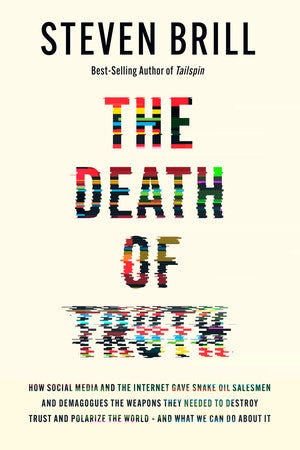Is Programmatic Advertising a Threat to Democracy?
Ethical Tech Project Founding Chair Tom Chavez reflects on his first-hand seat observing the rise of programmatic advertising and the implications for ethical data.
What do GEICO, Best Buy & Progressive Insurance have in common? In 2019, they all financed a propaganda machine of Vladimir Putin’s Kremlin: Sputnik News. They didn't do it intentionally. It's a result — and an all too common one — of programmatic advertising.
I was in the boiler room of the data-driven, programmatic advertising wave that overtook digital media in the mid- to late 00's. Krux, the company I headed at the time, was the data management system that brands and publishers used to interoperate with programmatic advertising systems from companies called SSP's (supply-side platforms) and DSP's (demand-side platforms) at the time. All of them died; only two, Google and The Trade Desk, are still standing.
I used to crow on stages about the 3.5 *BILLION* unique users per month Krux's infrastructure served. What I didn't talk about so much was this: it was increasingly clear that a lot of those 'uniques' were bots that were clicking on ads posted by low-value publishers who were milking the programmatic wave for money.
In his new book, The Death of Truth, journalist Steven Brill writes that:
“Programmatic advertising has thrived based on the central belief that all impressions aimed at the right target are equally valuable. So, if Sputnik News is selling an impression for less than a legitimate local newspaper is asking for it, Sputnik will win the auction. It’s a perpetual, instantaneous race to the bottom. If the bid for an impression on the Santa Monica Observer—a hoax website that ran a phony story about Nancy Pelosi’s husband, Paul, being with a male prostitute when he was brutally attacked last year—is lower than the bid offered for an ad on an article that tells the real story of what happened to Pelosi published by the San Francisco Chronicle, which pays real reporters to write real stories, then Hertz’s ad will be on the Observer story. As, indeed, it was.”
We've come to understand how social media platforms leverage poisonous recommendation algorithms to foment insurrection and misinformation. What's less discussed is how websites that advance misinformation chew up economics under the dark of night from high-value publishers who are still fighting to bring us fact-based news.
A Comscore analysis from 2021 concluded that programmatic advertising was feeding publishers of misinformation and disinformation to the tune of $2.6billion/year. Hard-hitting journalism, meanwhile, starves to the brink of extinction.
The net result: A highly efficient machine for propagating misinformation and directing money into the pockets of our adversaries. A machine that pollutes our mammalian brains, already pre-wired for outrage. A machine that imperils the journalistic institutions we depend on for facts and truth, and thereby subverts liberal democracy -- which is already on the bubble, now especially as we go into an American election with a Presidential candidate who's also a convicted felon.
What could go wrong? Everything.
Conversations in Ethical Tech
Episode 2: The Impact of a Federal Privacy Law
Join Ethical Tech Project Board Member Dr. Maritza Johnson and Board Advisor Jonathan Joseph (AKA ‘JJ’) for “Conversations in Ethical Tech!”
In this episode, JJ and Maritza dig into the recently proposed American Privacy Rights Act (read our initial reactions in this blog post).
What will the impact be on business, and why will it mean more businesses adopt data minimization?
Does the regulation cover dark patterns?
Why are we surprised at the inclusion of a private right of action for consumers in a major privacy bill?
JJ and Maritza break down the principles in clear terms that are helpful for privacy professionals and intelligible for the average citizen alike.
What We’re Reading on Ethical Tech This Week
The Ethical Tech Project - What the FTC Tells Us About Privacy
AdAge - Data Privacy - Why Brands Must Do More to Protect Consumers' Personal Information
TechRadar Pro - Millions of US customers have social security numbers stolen in major Sav-Rx data breach
CEPS - In the EU-US data transfer and privacy quarrel, the end is not in sight
FedScoop - FDA's Thomas Beach Strong Data Governance
Independent Sector: How States are taking charge of Data
Campaign - Data on a knife edge of what is legal
Global News - Temu faces class action







